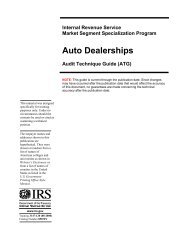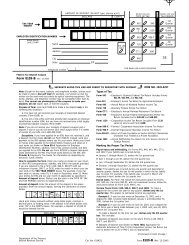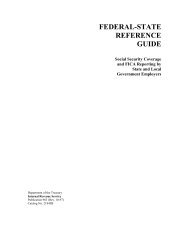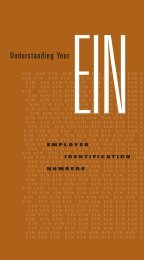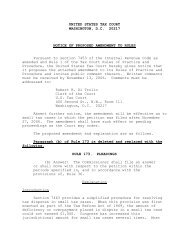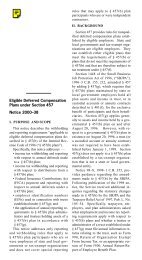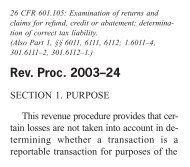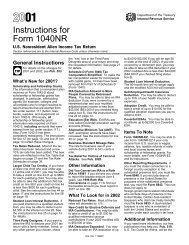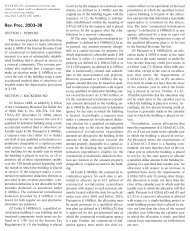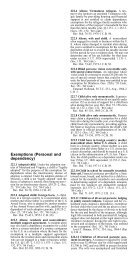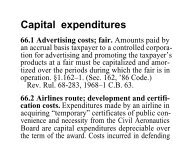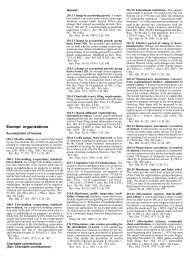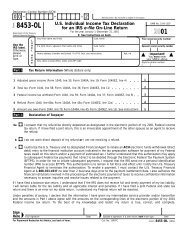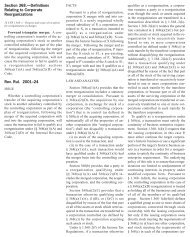Royalties
Royalties
Royalties
Create successful ePaper yourself
Turn your PDF publications into a flip-book with our unique Google optimized e-Paper software.
<strong>Royalties</strong><br />
pany is not subject to capital gains treatment under<br />
section 631(c), but is ordinary income subject to<br />
percentage depletion. Amounts received by the<br />
individual for obtaining coal leases determined by<br />
a rate per ton of coal purchased and processed by<br />
the coal company are not subject to capital gains<br />
treatment, but are ordinary income not subject to<br />
depletion. §§1.611-1, 1.631-3. (Secs. 611, 631;<br />
’86 Code.)<br />
Rev. Rul. 77–84, 1977–1 C.B. 173.<br />
446.14 Coal; surface lease. Royalty payments<br />
received under a lease granting the lessee the right<br />
to enter upon, use and/or destroy surface lands in<br />
order to prospect for and mine coal, the extraction<br />
of which is or will be covered by other leases, are<br />
not proceeds from the disposal of coal within the<br />
meaning of section 631(c). §1.631–3. (Sec. 631,<br />
’86 Code.)<br />
Rev. Rul. 79-144, 1979-1 C.B. 219.<br />
446.15 Coal land; advance; interest v. royalties.<br />
A partnership disposed of its working interest<br />
in leased coal property by contracting, as part of<br />
the same transaction, for a mining company to<br />
strip all the overburden from the tract in incremental<br />
parcels and for the mining company to sublease<br />
each parcel after stripping of the parcel was completed.<br />
Advances to the mining company for use<br />
in stripping the parcels under the sublease agreement<br />
to be repaid to the partnership in an amount<br />
equal to the amounts advanced constitute a loan,<br />
not development costs, Amounts received by the<br />
partnership exceeding repayment of the loan and<br />
interest are royalties from the sale of coal; stripping<br />
costs incurred by the mining company are<br />
operating cost, nondevelopment costs. §§1.616–1,<br />
1.631–3. (Secs. 616, 631; ’86 Code.)<br />
Rev. Rul. 77–308, 1977–2 C.B. 208.<br />
446.16 Coal land; exercise of option to purchase.<br />
Royalty payments received in exchange for<br />
an option to purchase coal land are not subject to<br />
capital gains treatment under section 631(c), but<br />
are taxable as ordinary income and subject to<br />
depletion deductions. §§1.61-8, 1.611-1,<br />
1.613-1, 1.631-3, 1.1231-1. (Secs. 61, 611, 613,<br />
631, 1231; ’86 Code.)<br />
Rev. Rul. 73-80, 1973–1 C.B. 308.<br />
446.17 Coal land; lease to joint venture;<br />
interest of lessor. Royalty income received by a<br />
power company for the lease of its coal lands, held<br />
more than six months, to a joint venture that<br />
included as a member the company’s wholly<br />
owned subsidiary and that sells the coal to the<br />
company is subject to the capital gains treatment<br />
under section 631. §§1.631-3, 1.1231–1. (Secs.<br />
631, 1231; ’86 Code.)<br />
Rev. Rul. 73–33, 1973–1 C.B. 307.<br />
446.18 Coal lease agreement between members<br />
of affiliated group; economic interest<br />
retained. An arms-length coal lease agreement in<br />
1972 between members of an affiliated group filing<br />
consolidated returns, in which the owner-lessor<br />
retained an economic interest and the lessee<br />
obtained the right to mine and dispose of the coal,<br />
does not constitute a deferred intercompany transaction<br />
within the meaning of reg. 1.1502–13<br />
(a)(2)(i) or (iii). Section 631(c) applies to the royalty<br />
payments received by the owner-lessor.<br />
§§1.611-1, 1.631–3, 1.1502-13. (Sec. 611, 631,<br />
1502; ’86 Code.)<br />
Rev. Rul. 74-10, 1974-1 C.B. 251.<br />
446.19 Coal or iron ore; bonuses and<br />
advanced royalties; rulings. As a condition to<br />
issuing a ruling that lessors of coal and iron ore<br />
may treat bonuses or advanced royalties as<br />
received from a sale of coal or iron ore under section<br />
631(c), the lessors will be required to enter<br />
into a closing agreement with respect to their tax<br />
liability. §1.631–3. (Sec. 601, 201, S.P.R.; Sec.<br />
631, ’86 Code.)<br />
Rev. Proc. 77-11, 1977-1 C.B. 568.<br />
446.20 Contested; accrual basis taxpayer. An<br />
accrual-method corporation and another company,<br />
under a cross-licensing and royalty agreement,<br />
paid each other a 2-percent royalty on the<br />
contract price of items covered by the other’s patents.<br />
Under the Royalty Adjustment Act of 1942,<br />
the Navy Department determined the royalties to<br />
be excessive for Navy contracts, and ordered the<br />
royalties suspended and the government reimbursed.<br />
After appeal, a compromise 1-percent royalty<br />
rate was reached. Held, the corporation was<br />
entitled to deduct royalties payable at the rate of 2<br />
percent while they remained legally contested but<br />
was not required to include the contested royalties<br />
receivable in income. (Secs. 41, 43, ’39 Code;<br />
Secs. 446, 461, ’86 Code.)<br />
Foster Wheeler Corp., 20 T.C. 15, Acq., 1953-2<br />
C.B. 4.<br />
446.21 Escrow account; ownership in dispute.<br />
Royalty payments deposited in escrow<br />
pending litigation regarding ownership of land are<br />
not to be included in the lessor’s income for the<br />
years in which they would otherwise have been<br />
payable, but should be reported as income for the<br />
year in which the litigation is settled or the lessor’s<br />
right to the royalties is established in some other<br />
way. I.T. 1212 superseded. §1.451–1. (Sec. 451,<br />
’86 Code.)<br />
Rev. Rul. 70-66, 1970-1 C.B. 114.<br />
446.22 Exempt organization; beneficial<br />
owner of patents. Amounts received from licensees<br />
by an exempt organization, the legal and beneficial<br />
owner of patents assigned to it by inventors<br />
for specified percentages of future royalties,<br />
constitute royalty income that is excludable in<br />
computing unrelated business taxable income.<br />
Rev. Rul. 73-193 distinguished. §1.512(b)-1.<br />
(Sec. 512, ’86 Code.)<br />
Rev. Rul. 76-297, 1976-2 C.B. 178.<br />
446.23 Exempt organization; patent development<br />
deductions. Patent development and management<br />
services fees deducted from royalties<br />
collected from licensees by an exempt charitable<br />
organization for distribution to beneficial owners<br />
of the patents is not within the exception for royalties<br />
provided by section 512(b) in determining<br />
“unrelated business taxable income” of the<br />
organization. Distinguished by Rev. Rul. 76–297.<br />
§1.512(b)-1. (Sec. 512, ’86 Code.)<br />
Rev. Rul. 73-193, 1973-1 C.B. 262.<br />
446.24 Foreign personal holding company<br />
income. A nonresident foreign corporation was<br />
entitled to a percentage of patent royalties paid by<br />
an American licensee to the foreign owner of the<br />
patents. Held, nonresident was contractually<br />
entitled to a percentage share in the owner’s<br />
income, not an interest in the patents or royalties<br />
as such; the payments received from the licensee<br />
were not received from sources within the U.S.<br />
and were not royalty income. (Secs. 119(a),<br />
502, ’39 Code; Secs. 543, 861, ’86 Code.)<br />
Hopag S.A. Holding de Participation et de Gestion<br />
de-Brevets Industriels, 14 T.C. 38, Acq.,<br />
1953-1 C.B. 4.<br />
446.25 Foreign trademark; initial U.S. sale.<br />
<strong>Royalties</strong> for the use of a foreign trademark on<br />
products that are ultimately used in foreign countries<br />
are income from sources without the U.S.<br />
even though the initial sale of the articles took<br />
place in the U.S. §§1.861-5, 1.862-1. (Secs. 861,<br />
862; ’86 Code.)<br />
Rev. Rul. 68-443, 1968-2 C.B. 304.<br />
446.26 Income in respect of decedent;<br />
decendent’s contract. Royalty payments<br />
received by a taxpayer under a contract executed<br />
by her mother (now deceased) as executrix of the<br />
estate of her father constitute taxable income to the<br />
taxpayer. However, she is entitled to deduct that<br />
portion of the estate tax paid which is attributable<br />
to the inclusion in the widow’s estate of the right<br />
to receive such royalty payments. Clarified and<br />
distinguished by Rev. Rul. 60-227. §1.691(a)-2.<br />
(Sec. 691, ’86 Code.)<br />
Rev. Rul. 57-544, 1957-2 C.B. 361.<br />
446.27 Income in respect of decedent; license<br />
arrangement; death of patent-holder. Where a<br />
contract between a patent owner and a manufacturer<br />
constitutes merely a “license” arrangement<br />
to manufacture and sell articles under the patent in<br />
return for the payment of royalties, and not a<br />
“sale,” royalty payments due and accrued under<br />
the contract at the date of the death of the inventor<br />
constitutes income in respect of a decedent. Royalty<br />
payments accrued after the date of death of the<br />
patent owner are ordinary income, includable in<br />
the gross income of the recipient. Rev. Rul.<br />
57-544 clarified and distinguished. §§1.61-8,<br />
1.691(a)-1. (Secs. 61, 691; ’86 Code.)<br />
Rev. Rul. 60-227, 1960-1 C.B. 262.<br />
446.28 Invention; stockholders paid for use.<br />
A corporation was allowed to deduct the cost of<br />
royalties paid to its two controlling stockholders<br />
for the use of their invention after the stockholders<br />
had given the corporation an irrevocable royaltyfree<br />
license to use the invention with the understanding<br />
that suitable compensation would be<br />
agreed upon at a later date. (Sec. 23(a), ’39 Code;<br />
Sec. 162, ’86 Code.)<br />
Heathbath Corp., 14 T.C. 332, Acq., 1957-2<br />
446.29 Mineral properties; interest retained.<br />
A grantor’s retention of a royalty interest payable<br />
out of mineral production is a retention of an economic<br />
interest, which makes the transaction<br />
incompatible with a sale; thus, lump sum payments<br />
received by him are ordinary income. Paul<br />
White decision not followed. §1.1231–1. (Sec.<br />
1231, ’86 Code.)<br />
Rev. Rul. 63-120, 1963–1, C.B. 141.<br />
446.30 Mineral properties; lump sum payment<br />
for rights. A lump sum payment received by<br />
the owner of land purportedly for fee simple title<br />
to all minerals in and under the land, but in conjunction<br />
with which he retained a royalty interest<br />
in any minerals produced from the land, is ordinary<br />
income and not proceeds from the sale of a<br />
capital asset. G.C.M. 27322 superseded.<br />
§§1.61-1, 1.1231-1. (Secs. 61, 1231; ’86 Code.)<br />
Rev. Rul. 69-352, 1969-1 C.B. 34.<br />
446.31 Mineral properties; lump sum payment<br />
for rights; interest retained. The lump sum<br />
payment received for a 65 percent interest in the<br />
minerals in place is not subject to a depletion<br />
allowance under section 611. The payment is for<br />
the sale of a capital asset defined in section 1221<br />
and entitled to capital gain treatment. §§1.611-1,<br />
1.1221-1. (Secs. 611, 1221; ’86 Code.)<br />
Rev. Rul. 82-221 1982–2 C.B. 113.<br />
446.32 Mineral properties; sale and leaseback<br />
with subsidiary. Where a parent corporation,<br />
for a price equivalent to book value, transfers<br />
mineral properties to a wholly owned subsidiary<br />
and leases back from the subsidiary for specified<br />
royalty payments in order to benefit from the<br />
allowance of both cost and percentage depletion,<br />
the transaction will be disregarded. §§1.61–3,<br />
1.162-1, 1.611-1, 1.612-1, 1.613–1. (Secs. 61,<br />
162, 611, 612, 613; ’86 Code.)<br />
Rev. Rul. 68-430, 1968-2 C.B. 44.<br />
446.33 Nonresident alien; author; withholding.<br />
Royalty payments made by a domestic publisher<br />
to a nonresident alien author while visiting<br />
the U.S., or to his designated domestic bank or resident<br />
agent, are subject to income tax withholding.



